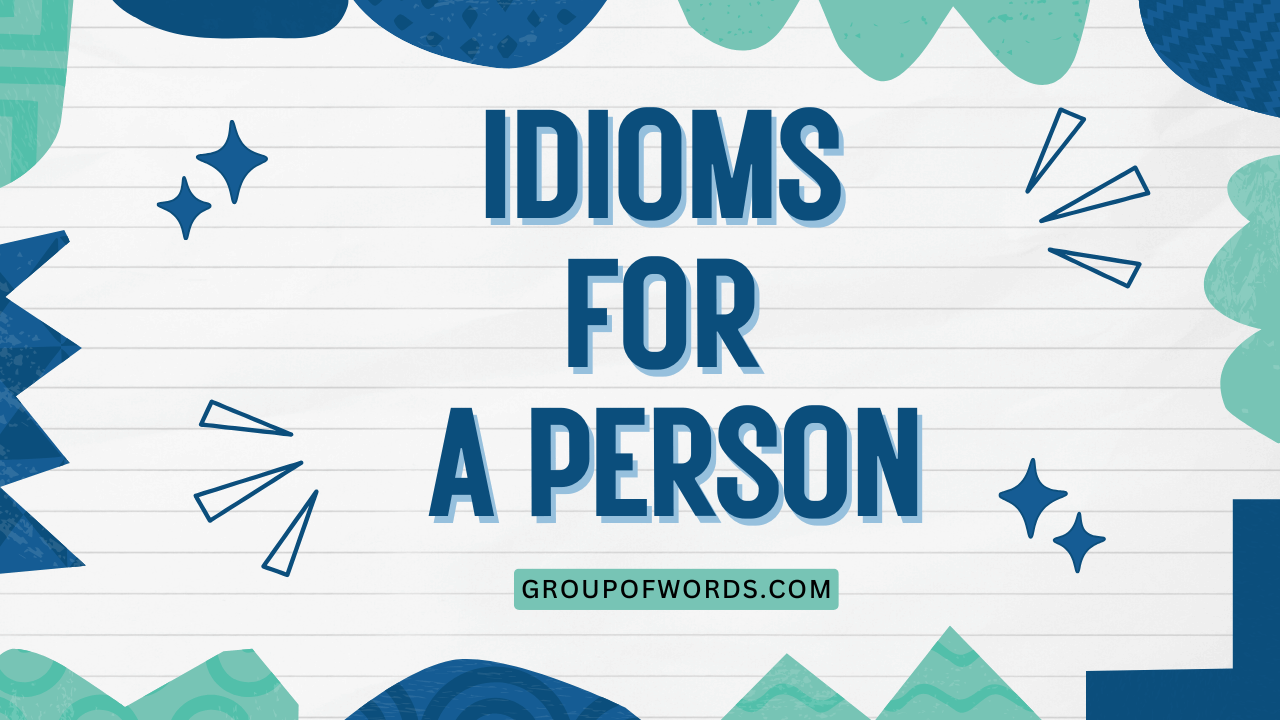Idioms for Describing People: A Comprehensive Guide
Idioms are colorful expressions that add flair and personality to the English language. Understanding idioms, especially those used to describe people, is crucial for effective communication and comprehension.
This article provides a comprehensive guide to idioms for describing people, exploring their meanings, structures, and usage. Whether you’re an English language learner, a writer, or simply someone who wants to enhance their vocabulary, this article will equip you with the knowledge and skills to master these expressive phrases.
This guide is designed for students, teachers, writers, and anyone interested in expanding their understanding of English idioms. By the end of this article, you will be able to recognize, interpret, and use a wide range of idioms for describing people in various contexts.
Table of Contents
- Definition of Idioms for Describing People
- Structural Breakdown of Idioms
- Types and Categories of Idioms for Describing People
- Examples of Idioms for Describing People
- Usage Rules for Idioms
- Common Mistakes When Using Idioms
- Practice Exercises
- Advanced Topics in Idiom Usage
- Frequently Asked Questions (FAQ)
- Conclusion
Definition of Idioms for Describing People
An idiom is a phrase or expression whose meaning cannot be understood from the literal meanings of its individual words. Idioms for describing people are phrases that characterize someone’s personality, behavior, appearance, skills, or other attributes in a figurative and often colorful way.
These idioms provide a succinct and vivid way to convey information about a person’s qualities, often adding nuance and emotional impact to the description.
Idioms function as single units of meaning, and their interpretations are culturally specific. This means that the same idiom can have different connotations or even be completely meaningless in different cultures or languages.
Understanding the cultural context in which an idiom is used is essential for accurate interpretation.
The context in which an idiom is used is vital. The surrounding words and the overall situation provide clues to the idiom’s intended meaning.
Without context, an idiom can be misinterpreted, leading to confusion or miscommunication. Idioms enrich our conversations and writing, but they must be used judiciously to avoid ambiguity.
Structural Breakdown of Idioms
Idioms can take various structural forms, including:
- Phrasal Verbs: Combinations of a verb and a preposition or adverb (e.g., “to clam up” means to become silent).
- Noun Phrases: Groups of words functioning as a noun (e.g., “a couch potato” means a lazy person).
- Adjectival Phrases: Groups of words functioning as an adjective (e.g., “as cool as a cucumber” means calm and composed).
- Complete Sentences: Short sentences with a figurative meaning (e.g., “He’s got his head in the clouds” means he’s impractical or unrealistic).
The meaning of an idiom is non-compositional, which means it cannot be derived from the individual meanings of its constituent words. For example, the idiom “a wet blanket” does not literally refer to a damp piece of fabric; instead, it describes someone who spoils the fun or enthusiasm of others. Recognizing this non-compositionality is key to understanding and using idioms correctly.
Many idioms contain metaphorical or figurative language, drawing parallels between unrelated concepts to create a vivid image or convey a specific meaning. For instance, the idiom “a heart of gold” uses the metaphor of precious metal to describe someone who is kind and generous. Understanding the underlying metaphors can help in grasping the intended meaning of the idiom.
Types and Categories of Idioms for Describing People
Idioms for describing people can be categorized based on the aspect of the person they describe. Here are some common categories:
Idioms Describing Personality
These idioms describe someone’s general character and disposition, such as whether they are outgoing, introverted, optimistic, or pessimistic.
Idioms Describing Behavior
These idioms describe how someone acts in specific situations or their typical patterns of conduct, like being helpful, rude, or cautious.
Idioms Describing Appearance
These idioms describe someone’s physical attributes, such as their attractiveness, build, or style.
Idioms Describing Skills and Abilities
These idioms describe someone’s talents, competencies, or areas of expertise, such as being skilled, clumsy, or knowledgeable.
Idioms Describing Character Traits
These idioms describe fundamental aspects of a person’s moral and ethical nature, such as honesty, integrity, or courage.
Examples of Idioms for Describing People
Here are several examples of idioms for describing people, organized by category:
Personality Idioms Examples
The table below contains personality idioms with example sentences.
| Idiom | Meaning | Example Sentence |
|---|---|---|
| A people person | Someone who enjoys and is good at interacting with others. | She’s a real people person and excels at customer service. |
| A social butterfly | Someone who is very social and flits from one social event to another. | He’s such a social butterfly; he’s always at parties and gatherings. |
| A lone wolf | Someone who prefers to be alone and independent. | As a lone wolf, he prefers working on projects independently. |
| A ray of sunshine | Someone who is cheerful and brings happiness to others. | Her positive attitude makes her a ray of sunshine in the office. |
| A wet blanket | Someone who spoils the fun or enthusiasm of others. | Don’t invite him; he’s such a wet blanket at parties. |
| A party animal | Someone who loves to party and enjoys social gatherings. | During college, he was a real party animal, always out late. |
| A couch potato | Someone who spends a lot of time sitting and watching television. | After a long day at work, I just want to be a couch potato. |
| A busybody | Someone who interferes in other people’s affairs. | The neighbor is such a busybody, always gossiping. |
| A chatterbox | Someone who talks a lot. | She’s such a chatterbox; it’s hard to get a word in edgewise. |
| A shrinking violet | Someone who is shy and timid. | She used to be a shrinking violet, but she’s gained confidence over time. |
| A tough cookie | Someone who is strong and resilient. | She’s a tough cookie and can handle any challenge. |
| A soft touch | Someone who is easily persuaded to give money or help. | He’s such a soft touch; he always donates to charities. |
| A happy camper | Someone who is content and satisfied. | After the promotion, he’s been a happy camper. |
| A grump | Someone who is irritable and bad-tempered. | He’s a bit of a grump in the mornings before his coffee. |
| A drama queen | Someone who overreacts to situations. | She’s such a drama queen; everything is a crisis. |
| A control freak | Someone who tries to control every aspect of a situation. | He’s a control freak and micromanages everything. |
| A free spirit | Someone who is independent and unconventional. | She’s a free spirit and lives life on her own terms. |
| A go-getter | Someone who is ambitious and proactive. | He’s a real go-getter and always takes initiative. |
| A daydreamer | Someone who spends a lot of time thinking about pleasant things instead of paying attention to what is happening around them. | She’s such a daydreamer; she’s always lost in her thoughts. |
| The life of the party | Someone who is lively and entertaining at social events. | He’s always the life of the party, making everyone laugh. |
Behavior Idioms Examples
The table below contains behavior idioms with example sentences.
| Idiom | Meaning | Example Sentence |
|---|---|---|
| To be a know-it-all | To act as if one knows everything. | He’s such a know-it-all; he always has to correct everyone. |
| To be a show-off | To behave in a way that is intended to attract attention. | He’s always showing off his new car to impress people. |
| To be a pushover | To be easily influenced or persuaded. | She’s such a pushover; she can’t say no to anyone. |
| To be a troublemaker | To cause problems or difficulties. | He’s always been a troublemaker, getting into fights. |
| To be a busybody | To interfere in other people’s affairs. | The neighbor is such a busybody, always asking personal questions. |
| To be a yes-man | To agree with everything someone says, especially a superior. | He’s just a yes-man, always agreeing with the boss. |
| To be a cheapskate | To be unwilling to spend money. | He’s such a cheapskate; he never pays for anything. |
| To be a spendthrift | To spend money extravagantly or wastefully. | She’s a spendthrift and always buys expensive things. |
| To be a control freak | To try to control every aspect of a situation. | He’s a control freak and micromanages everything. |
| To be a backseat driver | To give unwanted advice or instructions. | She’s such a backseat driver, always telling me how to drive. |
| To be a clock-watcher | To pay close attention to the time, especially towards the end of the workday. | He’s a real clock-watcher, always waiting for the day to end. |
| To be a creature of habit | To follow a routine and dislike change. | He’s a creature of habit and always does the same things. |
| To be a rule-breaker | To disobey or ignore rules. | She’s a rule-breaker and always challenges authority. |
| To be a team player | To work well with others in a group. | He’s a great team player and always helps his colleagues. |
| To be a lone wolf | To prefer to work alone and independently. | He’s a lone wolf and prefers to work on his own. |
| To be a workaholic | To be addicted to work. | He’s a workaholic and spends all his time at the office. |
| To be a wallflower | To be shy and stay on the sidelines at social events. | She’s a wallflower and rarely participates in group activities. |
| To be a worrywart | To worry excessively about things. | She’s a worrywart and always anticipates the worst. |
| To be a people pleaser | To try to make everyone happy. | He’s a people pleaser and always puts others first. |
| To be a complainer | To constantly complain about things. | He’s a complainer and always finds something to gripe about. |
Appearance Idioms Examples
The table below contains appearance idioms with example sentences.
| Idiom | Meaning | Example Sentence |
|---|---|---|
| As pretty as a picture | Very attractive or beautiful. | She looked as pretty as a picture in her wedding dress. |
| Dressed to kill | Wearing clothes that are intended to impress. | He was dressed to kill for the important business meeting. |
| A diamond in the rough | Someone who has potential but lacks refinement. | He’s a diamond in the rough, but with training, he’ll excel. |
| Easy on the eyes | Pleasant to look at; attractive. | She’s very easy on the eyes, with a stunning smile. |
| All skin and bones | Extremely thin, often in an unhealthy way. | After being sick, he was all skin and bones. |
| A sight for sore eyes | Someone or something that is a welcome sight. | After being lost in the woods, the cabin was a sight for sore eyes. |
| To have a baby face | To have a youthful appearance. | He has a baby face, so people often think he’s younger than he is. |
| To be a knockout | To be extremely attractive. | She was a real knockout in her red dress. |
| To be well-groomed | To be neat and tidy in appearance. | He’s always well-groomed and takes pride in his appearance. |
| To be a fashion plate | To be someone who always wears fashionable clothes. | She’s a real fashion plate and always looks stylish. |
| To have a figure to die for | To have a very attractive physique. | She has a figure to die for, always working out at the gym. |
| To be no oil painting | To be unattractive. | He’s no oil painting, but he has a great personality. |
| To be vertically challenged | To be short (euphemism). | He’s a bit vertically challenged, but he’s very athletic. |
| To be built like a brick house | To be very strong and sturdy. | He’s built like a brick house from years of weightlifting. |
| To be a shadow of one’s former self | To be in a weaker or less healthy condition than before. | After the illness, he was just a shadow of his former self. |
| To have a commanding presence | To have an imposing and noticeable appearance. | She has a commanding presence that demands respect. |
| To be the spitting image of | To look exactly like someone else. | She’s the spitting image of her mother when she was young. |
| To turn heads | To attract attention because of one’s appearance. | She always turns heads wherever she goes. |
| To be a vision | To be very beautiful or attractive. | She was a vision in her elegant gown. |
| To be a plain Jane | To be an ordinary or unattractive woman. | She considers herself a plain Jane, but she has a kind heart. |
Skill Idioms Examples
The table below contains skill idioms with example sentences.
| Idiom | Meaning | Example Sentence |
|---|---|---|
| To be a whiz | To be very skilled or knowledgeable. | He’s a whiz at computer programming. |
| To be a natural | To have an innate talent or ability. | She’s a natural at playing the piano. |
| To have a green thumb | To be good at gardening. | My grandmother has a green thumb; her garden is beautiful. |
| To be all thumbs | To be clumsy or awkward. | I’m all thumbs when it comes to fixing things. |
| To be quick on the uptake | To understand things quickly. | She’s very quick on the uptake and learns new skills easily. |
| To be slow on the uptake | To be slow to understand things. | He’s a bit slow on the uptake sometimes, but he’s very thorough. |
| To have an ear for music | To have a natural talent for music. | He has an ear for music and can play any instrument. |
| To be a jack-of-all-trades | To be good at many different things. | He’s a jack-of-all-trades and can fix anything around the house. |
| To be a master of none | To be good at many things but not an expert in any. | He’s a jack-of-all-trades, but a master of none. |
| To be a smooth operator | To be skilled at persuading or manipulating others. | He’s a smooth operator and always gets what he wants. |
| To be a wordsmith | To be skilled with words and writing. | She’s a wordsmith and writes beautiful poetry. |
| To be a numbers person | To be good with numbers and mathematics. | He’s a numbers person and works as an accountant. |
| To be a people person | To be good at interacting with others. | She’s a people person and excels at customer service. |
| To be a problem solver | To be good at finding solutions to problems. | He’s a great problem solver and always finds creative solutions. |
| To be a visionary | To have original and creative ideas about the future. | He’s a visionary and has transformed the company. |
| To be a strategist | To be skilled at planning and strategy. | She’s a brilliant strategist and always plans ahead. |
| To be a detail-oriented person | To pay close attention to details. | He’s very detail-oriented and ensures everything is accurate. |
| To be a self-starter | To be able to start tasks independently. | She’s a self-starter and doesn’t need constant supervision. |
| To be a team player | To work well with others in a group. | He’s a great team player and always helps his colleagues. |
| To be a leader | To guide and inspire others. | She’s a natural leader and motivates her team effectively. |
Character Idioms Examples
The table below contains character idioms with example sentences.
| Idiom | Meaning | Example Sentence |
|---|---|---|
| A heart of gold | A kind and generous nature. | She has a heart of gold and always helps those in need. |
| Down to earth | Practical and realistic. | Despite his wealth, he’s very down to earth and approachable. |
| As good as gold | Well-behaved and obedient. | The children were as good as gold during the long car ride. |
| True blue | Loyal and faithful. | He’s a true blue friend and always stands by me. |
| Straight as an arrow | Honest and upright. | He’s straight as an arrow and always tells the truth. |
| Larger than life | Having an exaggerated or flamboyant personality. | He’s a larger than life character and always makes an impression. |
| Salt of the earth | A person who is honest and reliable. | He’s the salt of the earth, always willing to lend a hand. |
| A man/woman of his/her word | Someone who keeps their promises. | He’s a man of his word and always follows through. |
| Has a thick skin | Not easily offended by criticism. | She has a thick skin and can handle tough feedback. |
| Has a short fuse | Easily angered. | He has a short fuse and gets angry very quickly. |
| All bark and no bite | Threatening but not actually dangerous. | He’s all bark and no bite; he makes a lot of noise but doesn’t act. |
| As stubborn as a mule | Very obstinate and unwilling to change. | She’s as stubborn as a mule and won’t listen to advice. |
| As brave as a lion | Very courageous. | He was as brave as a lion during the rescue. |
| As sly as a fox | Cunning and deceitful. | He’s as sly as a fox and always finds a way to get what he wants. |
| As gentle as a lamb | Very kind and gentle. | She’s as gentle as a lamb and treats everyone with kindness. |
| As wise as an owl | Very wise and knowledgeable. | He’s as wise as an owl and always gives good advice. |
| A wolf in sheep’s clothing | Someone who appears harmless but is actually dangerous. | He’s a wolf in sheep’s clothing; be careful around him. |
| A cold fish | Someone who is unemotional and unfriendly. | She’s a cold fish and doesn’t show much emotion. |
| A dark horse | Someone who has unexpected talents or abilities. | He’s a dark horse; no one expected him to win the competition. |
| A golden boy/girl | Someone who is very successful and popular. | He’s the golden boy of the company and is destined for success. |
Usage Rules for Idioms
When using idioms, it’s important to keep the following rules in mind:
- Context: Always consider the context in which you are using the idiom. The surrounding words and the overall situation should make the meaning clear.
- Audience: Be aware of your audience. Some idioms are more common than others, and using unfamiliar idioms can confuse your listeners or readers.
- Formality: Idioms are generally more appropriate in informal settings. Avoid using them in formal writing or presentations unless you are sure they are appropriate.
- Accuracy: Use the idiom correctly. Changing the words or structure of an idiom can alter its meaning or make it nonsensical.
- Overuse: Avoid overusing idioms. Using too many idioms can make your writing or speech sound contrived and unnatural.
It’s also important to be aware of regional variations in idiom usage. Some idioms are more common in certain regions or countries than others.
Using an idiom that is not common in your audience’s region can lead to confusion or miscommunication. For example, an idiom common in British English might not be well-known in American English, and vice versa.
Finally, be mindful of cultural sensitivity. Some idioms can be offensive or inappropriate in certain cultural contexts.
Avoid using idioms that are based on stereotypes or that could be seen as disrespectful to any group or individual.
Common Mistakes When Using Idioms
One common mistake is taking idioms literally. Since idioms have figurative meanings, interpreting them literally can lead to misunderstandings. For example, if someone says, “He’s pulling my leg,” they don’t literally mean that they are being physically harmed. Instead, it means they are being teased or joked with.
Another common mistake is misusing or altering idioms. Idioms have fixed structures, and changing the words or grammar can change the meaning or make the idiom nonsensical. For instance, saying “She has a gold of heart” instead of “She has a heart of gold” is incorrect and doesn’t convey the intended meaning.
Mixing up similar idioms is also a frequent error. For example, confusing “bite the bullet” (to face a difficult situation with courage) with “beat around the bush” (to avoid talking about the main point) can lead to confusion. Understanding the precise meaning of each idiom is crucial to using them correctly.
Here are some examples of common mistakes and their corrections:
| Incorrect | Correct | Explanation |
|---|---|---|
| He’s pulling my hair. | He’s pulling my leg. | “Pulling my leg” means teasing, not physical harm. |
| She has a gold of heart. | She has a heart of gold. | The correct idiom is “heart of gold”. |
| Bite around the bush. | Beat around the bush. | The correct idiom is “beat around the bush”. |
| He’s feeling under the weather but on top of the world. | He’s feeling under the weather. | “Under the weather” and “on top of the world” have opposite meanings, thus cannot be used in conjunction. |
| She is the apple of his eyes. | She is the apple of his eye. | The correct idiom is “apple of his eye”. |
Practice Exercises
Test your understanding of idioms with these practice exercises.
Exercise 1: Choose the correct idiom to complete each sentence.
| Question | Options | Answer |
|---|---|---|
| He’s always causing trouble; he’s a real ____. | a) busybody b) troublemaker c) wet blanket | b) troublemaker |
| She’s very shy and quiet; she’s a ____. | a) social butterfly b) chatterbox c) shrinking violet | c) shrinking violet |
| He’s very good with numbers; he’s a ____. | a) numbers person b) wordsmith c) people person | a) numbers person |
| She’s very kind and generous; she has a ____. | a) heart of stone b) heart of gold c) heart of lead | b) heart of gold |
| He’s always dressed to impress; he’s ____. | a) dressed down b) dressed to kill c) dressed casually | b) dressed to kill |
| She understands things quickly; she’s ____. | a) slow on the uptake b) quick on the uptake c) all thumbs | b) quick on the uptake |
| He’s very stubborn; he’s ____. | a) as gentle as a lamb b) as sly as a fox c) as stubborn as a mule | c) as stubborn as a mule |
| She’s always happy and cheerful; she’s a ____. | a) ray of sunshine b) wet blanket c) drama queen | a) ray of sunshine |
| He’s very clumsy; he’s ____. | a) all thumbs b) a natural c) a whiz | a) all thumbs |
| She’s very loyal and faithful; she’s ____. | a) true blue b) cold fish c) dark horse | a) true blue |
Exercise 2: Match the idiom to its meaning.
| Idiom | Meaning |
|---|---|
| 1. A couch potato | a. Someone who is easily persuaded |
| 2. A soft touch | b. Someone who loves to party |
| 3. A party animal | c. Someone who is lazy and watches TV |
| 4. A control freak | d. Someone who is independent and unconventional |
| 5. A free spirit | e. Someone who tries to control everything |
Answers:
- 1-c
- 2-a
- 3-b
- 4-e
- 5-d
Exercise
3: Fill in the blanks with the appropriate idiom.
- He is so good at fixing things; he is a real ______________.
- She is always trying to please everyone; she is such a ______________.
- Even though he’s rich, he is very ______________ and humble.
- She is always in the spotlight; she is the ______________ of the company.
- He never spends money; he is known to be a ______________.
Possible Answers:
- Jack-of-all-trades
- People-pleaser
- Down to earth
- Golden boy/girl
- Cheapskate
Advanced Topics in Idiom Usage
Idioms can also be used creatively and adapted to fit new contexts. This involves understanding the underlying meaning and structure of the idiom and then modifying it in a way that still makes sense but adds a unique twist.
For example, instead of saying “He’s burning the midnight oil,” you could say “She’s burning the early morning electricity” to describe someone who works early in the morning.
Idioms can be used to create humor in writing and speech. By using idioms in unexpected or ironic ways, you can create a humorous effect.
For instance, saying “He’s not the sharpest tool in the shed, but he’s a good friend” is a humorous way of saying someone is not very intelligent.
Idioms can also be used for emphasis and emotional impact. By choosing idioms that are particularly vivid or evocative, you can add emotional weight to your writing or speech.
For example, saying “She went through hell and high water” is a more emphatic way of saying someone faced many challenges.
Frequently Asked Questions (FAQ)
What is the difference between an idiom and a metaphor?
An idiom is a phrase whose meaning is not deducible from the literal meanings of the words, while a metaphor is a figure of speech that directly compares two unrelated things. Idioms often contain metaphors, but not all metaphors are idioms.
How can I improve my understanding of idioms?
Read widely, listen to native speakers, and pay attention to the context in which idioms are used. Keep a notebook of new idioms you encounter and practice using them in your own writing and speech.
Are idioms universal?
No, idioms are culturally specific and vary from language to language and region to region. What is an idiom in one language may not make sense in another.
Can I create my own idioms?
While it’s possible to create new phrases, they only become idioms if they gain widespread use and acceptance. Otherwise, they are simply figures of speech.
How do I avoid misusing idioms?
Pay attention to the context, understand the precise meaning of the idiom, and avoid altering the words or structure of the idiom.
Conclusion
Mastering idioms for describing people is a valuable skill that enhances communication, comprehension, and cultural understanding. By understanding the definition, structure, and usage rules of idioms, you can effectively incorporate them into your vocabulary and express yourself with greater precision and color.
Whether you’re describing someone’s personality, behavior, appearance, skills, or character traits, idioms provide a rich and expressive way to convey information and add depth to your language.






